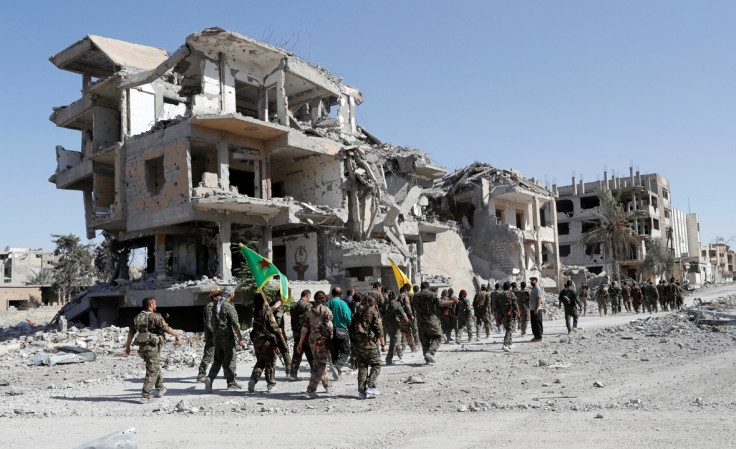The liberation of Raqqa does not mean the end of Isis
Terrorist group is moving towards an insurgency model after significant loss of territory in Syria and Iraq.
The recapture of most areas of Raqqa from Isis by the US-supported Syrian Democratic Forces (SDF) is a major milestone in the fight against this terrorist group.
Although Raqqa is not as strategically important for Isis as other areas it had taken over, its recapture is an emblematic loss for the group which had designated Raqqa as the capital of the so-called Islamic State. The loss of Raqqa means the end of Isis' physical 'caliphate' project. But this capture does not signal the end of Isis.
The SDF managed to take over Raqqa quicker than anticipated partly because of the deals they brokered with Isis fighters in the area, through which the SDF allowed Isis fighters to flee Raqqa before the forces' incursion into the city.
Some Isis fighters who accepted the deal have fled in the direction of Al-Bukamal and Mayadeen in the Deiz Ezzor governorate. Those cities remain Isis strongholds, with fighters having withdrawn to them following loss of territory elsewhere. Being the last urban bastions of Isis control in the area, the terrorist group will put up a fierce fight when the battle to recapture them begins.
As Raqqa was never a key operational centre for Isis, losing the city does not mean a significant reduction in the group's capacity. Although Raqqa had administrative centres and courts and bureaus for Isis officials, the organisation's top leadership did not reside in the city or formulate its strategies and policies from there. This means that the group's ability to create and disseminate propaganda and military operations continues to be relatively strong.
From the beginning, Isis has directed its operations not from Mosul or Raqqa but from the desert between Syria and Iraq, where Isis leaders have been hiding underground. This area is a lot more difficult for forces like the SDF to take over because it is a rough and open territory that is complicated to control and hold. Isis fighters who did not head in the direction of cities in Deir Ezzor have ended up in this area.
With Raqqa quickly emptied of Isis fighters, obliterating this group appears to be closer to being achieved than the reality indicates. It is likely that some of the Isis fighters who have left Raqqa are going to engage in revenge operations in the area. Not all fighters are likely to do so, because of the deals that they have brokered with the SDF before the battle for retaking Raqqa began. But for Isis hardliners who believe in continuing to fight till the end, the story is far from over.
What will change for Isis under the new configuration of power distribution in north-eastern Syria are the tactics it will use. With the group losing urban territory, it is moving increasingly in the direction of becoming an insurgency. Asymmetric attacks are likely to increase in frequency in areas that Isis has now lost.

Isis will also not easily give up oil-rich areas in Deir Ezzor, because it has been relying on the sale of oil on the black market as a source of income. Iran's active role in the battle against Isis in Deir Ezzor through the deployment of Shiite militias is only fuelling the sectarian narrative that Isis uses to rally its Sunni supporters to its side.
However, Isis also has links with the Syrian regime's intelligence services, who have been playing a key role in influencing the movements of operatives to the advantage of Iranian-sponsored groups. When fighters on the Lebanese-Syrian border purported to be members of Isis this summer, a swift evacuation was brokered by Hezbollah and the Syrian regime.
While Isis so far has managed to retain its power hierarchy and direct its activities from the top, Iran's indirect influence over the group, coupled with the increasing pace of moving towards an insurgency model, mean that it is likely that Isis will transform and give birth to different offshoots. Foreign fighters who have nowhere to go outside Syria and Iraq are likely to remain attracted to whatever group they can pragmatically join.
This scenario is reminiscent of the evolution of al-Qaeda, where the organisation set up franchises in different locations, each with their own set of priorities. And like al-Qaeda before it, Isis is also likely to step up activating its supporters around the world to engage in opportunistic attacks as a way to assert its presence. This becomes increasingly likely since Isis has often used such opportunistic attacks as a way to compensate for loss of territory in Iraq and Syria.
Above all else, the social, economic and political dynamics on the ground in Raqqa and other areas that have been won back from Isis will play an important role in determining whether there will be resurgence for the group or others like it in future. After all, Isis came into existence partly because of social, economic and political grievances that pushed people in its direction, either because they thought it would be a better alternative to their rulers or because they sought in it a way to exact revenge on those rulers. This underlines the importance of not focusing too narrowly on the military defeat of Isis in Raqqa as the indicator of survival for this group.
Lina Khatib is head of the Middle East and North Africa (MENA) Programme at Chatham House.






